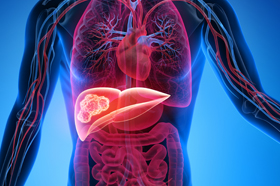FDA Approves Liver-Directed Therapy to Treat Metastatic Uveal Melanoma
 Delcath Systems, Inc. has received US Food and Drug Administration (FDA) approval for HEPZATO KIT (melphalan/Hepatic Delivery System) as a liver-directed treatment for adult patients with metastatic uveal melanoma (mUM) with unresectable hepatic metastases affecting less than 50% of the liver and no extrahepatic disease, or extrahepatic disease limited to the bone, lymph nodes, subcutaneous tissues, or lung that is amenable to resection or radiation.
Delcath Systems, Inc. has received US Food and Drug Administration (FDA) approval for HEPZATO KIT (melphalan/Hepatic Delivery System) as a liver-directed treatment for adult patients with metastatic uveal melanoma (mUM) with unresectable hepatic metastases affecting less than 50% of the liver and no extrahepatic disease, or extrahepatic disease limited to the bone, lymph nodes, subcutaneous tissues, or lung that is amenable to resection or radiation.
mUM is a rare and aggressive form of metastatic cancer with a US incidence of approximately 1,000 cases per year. Ninety percent of mUM involves the liver, and liver failure is often the cause of death. National Comprehensive Cancer Network (NCCN) guidelines recommend liver-directed therapies for mUM patients with liver metastases. HEPZATO KIT is the only liver-directed therapy approved by the FDA for the treatment of mUM and percutaneous hepatic perfusion (PHP), the procedure enabled by HEPZATO KIT, is already included in the NCCN guidelines.
"FDA approval of HEPZATO KIT marks the beginning of a new chapter for Delcath and the culmination of the Company's commitment to bring this treatment option to patients suffering from metastatic uveal melanoma," said Gerard Michel, Delcath's Chief Executive Officer. "We look forward to partnering with cancer centers across the country to build a network of treatment sites trained in the use of this novel therapy."
The Company plans to have commercial product available in the fourth quarter, and patients will continue to be enrolled and treated at Expanded Access Program (EAP) sites.
The approval of HEPZATO KIT was based primarily on the results of the FOCUS Study (NCT02678572), a Phase 3, single arm, multicenter, open label study, which administered HEPZATO (melphalan) via the hepatic delivery system (HDS) during a PHP procedure. Ninety-one (91) patients received treatment every 6 to 8 weeks, for up to 6 treatments. The main efficacy endpoints were objective response rate (ORR) and duration of response (DoR) as assessed by an independent review committee using RECIST v1.1. ORR was 36.3% (95% CI: 26.4, 47.0) and median DoR was 14 months (95% CI: 8.3, 17.7). The Disease Control Rate (DCR) observed in treated patients was 73.6% (95% CI: 63.3, 82.3) with 7 complete responses (7.7%), and 26 (28.6%) partial responses.
The patient population enrolled in the FOCUS Study included patients with hepatic and extra-hepatic lesions subject to a treatment plan, as well as both treatment naïve (56.0%) and previously treated (44.0%) patients, irrespective of HLA genotype.
The HEPZATO KIT prescribing information has a boxed warning, which includes three sections: toxicity related to the procedure, myelosuppression and a Risk Evaluation and Mitigation Strategy program, commonly known as REMS, to manage and mitigate these risks. Serious adverse events associated with the PHP procedure with the HEPZATO KIT, such as hemorrhage, hepatocellular injury, and thromboembolic events, occurred in less than 5% of treated patients. Myelosuppressive adverse events including thrombocytopenia, anemia, and neutropenia, are well-known and predictable side effects of melphalan and are routinely managed with standard supportive care measures.
The HEPZATO KIT REMS is designed to ensure consistent conduct of the PHP procedure and that only treatment teams who have received appropriate training perform the PHP procedure.
"HEPZATO KIT is the only liver-directed therapy that can treat the whole liver," said Vojislav Vukovic, Delcath's Chief Medical Officer. "Scientific literature supports that HEPZATO KIT may have broad applicability in other tumor types, and we intend to expand our development efforts beyond uveal melanoma given the high incidence of unresectable hepatic dominant tumors."